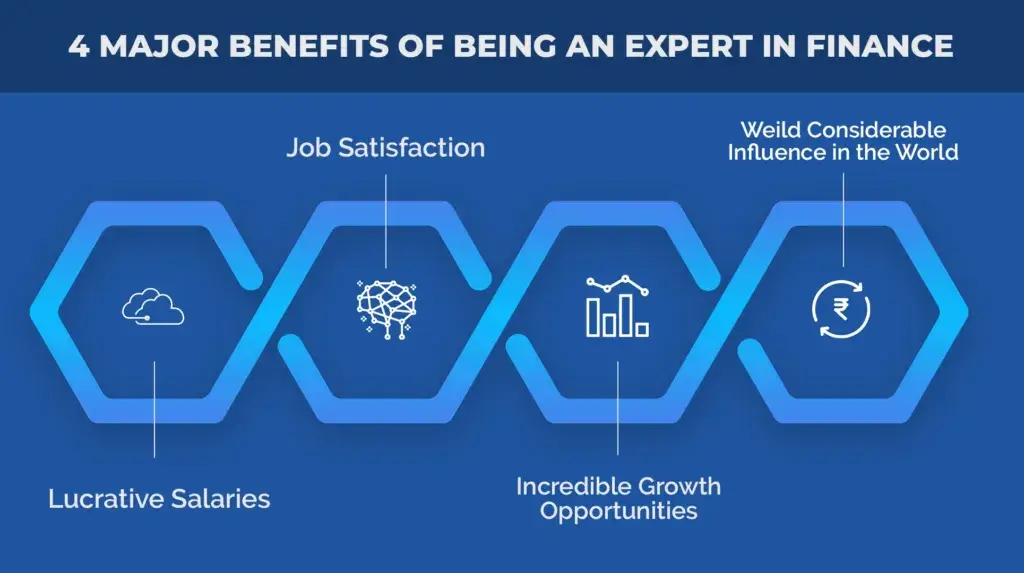Top 7 Skills That Make You An Expert In Finance

Here's What We've Covered!
It takes more than a good head for numbers to succeed in finance. You need to be dedicated, committed and hard-working as well. There’s more. To be a certified expert in finance, you need seven special skills to forge your own path in the industry. What are they? We’ll get to them in a minute.
Whether you want to work in investment services, banking, wealth management or financial planning, you have many challenges to face. There are limited profiles with top companies and an army of competitive and qualified peers gunning for the same job. The pressure is intense. The expectations are sky-high. Whoever is lucky enough to get their name on the business card has to prove they have the chops to be a valuable addition to the company. So let’s find out how to become an expert in finance.
Benefits of working in the finance field
- Salaries are the highest here compared to other industries.
- The finance field offers so much potential for prosperity.
- There are several job profiles to pursue that suit your abilities and interests.
- There are many opportunities to move up the hierarchal ladder.
- The perks and benefits get substantially higher with experience.
- The roles and responsibilities are diverse and challenging, which can lead to job satisfaction.
- Finance professionals are in high demand due to their high calibre of skills.
- As an expert in finance, you have high chances to work anywhere in the world or get the opportunity to travel for work.
7 Skills You Need To Become A Successful Finance Professional
For those of you wondering how to become an expert in finance, here are seven important abilities you should have or acquire to achieve your goal.
- Efficient accounting skills
Across the entire gamut of financial profiles, almost all of them require candidates with a strong understanding of accounting. It even helps if you have a certificate in the field. Why is it so essential? Accounting is crucial to corporate finance. It helps you understand the nuances of transactions and cash flow. Ask any expert in finance, and they’ll tell you that an accounting qualification can even help you reach the position of CFO, finance controller or chief investment officer. Most companies prefer to hire professionals who have a CA, CIMA, CPA or ACCA certification. So ensure your accounting concepts are sound, as it helps you build a solid foundation for your financial career.
- Knowledge of financial reporting
One of the ways on how to become an expert in finance is to be able to decode and analyse financial reports. When you can interpret these reports accurately, you are in a position to give advice or recommendations. You understand the information and its value, you know what steps to take next, and you can make strategic decisions for the organisation. This is true for most finance roles, so make sure you are proficient in financial reporting before you embark on your career.
- Budget planning
There isn’t a company in the world which can make a profit without a firm handle on the budget. You must know how to prepare budgets for a specific project, department, or even the entire company. A keen understanding of how to allot funds according to priorities and availability of resources is a basic requirement for any expert in finance.
Your budgeting capabilities should be in accordance with the company’s strategic plans, so you need to cover long-term goals when planning. Finance experts also need to know how to perform variance analysis between the actual and forecast budgets.
Looking for a course that will enable you to become a master in finance domain?
- Forecasting abilities
The mark of an expert in finance is the capability to make predictions about the markets. It’s a vital part of many job profiles in this industry. A finance modelling certification can help you learn how to build models that can analyse the present financial conditions to make predictions. You can assess the various risks and threat factors, avoid unnecessary roadblocks and improve profitability. Through careful strategic planning, you can add immense value to the company. Now, that is a key factor in how to become an expert in finance.
- Data analytics
The finance industry has greatly benefited from harvesting big data. Banking analytics uses high-end technology and AI systems to process data collected online. It helps with fraud detection, credit management and even customer service. Finance experts can also get a better understanding of KPIs, revenue statistics and income generated through data analysis. It is widely used in sectors such as investment banking, equity research and wealth management. If you’re taking notes on how to become an expert in finance, remember that data analytics forms a vital part of your success.
- FinTech savvy
Welcome to finance in the 21st century. Customers and companies are using applications, software systems and other specialised fields of advanced technology. The industry now has chatbots, AI advisors, investment apps, online banking websites and many new-age variations of traditional finance departments. If you want to be an expert in finance, you must embrace FinTech as an integral part of your work.
- Willingness to innovate and adapt
Nothing in finance ever stays the same. That is a guarantee. Every generation brings its own set of unique ideas and innovations that act as game-changers for the industry. Data science and FinTech are prime examples. This is no profession for people stuck in the past. You need to be able to move ahead with the changes as they come. Learn the ropes, adapt quickly and integrate the new systems into your career. Every development to date has only strengthened the finance world, so it’s important to stay on trend if you want to succeed as an expert in finance.
4 Trending Certifications That Make You An Expert In Finance
Are you a commerce student who wants to learn how to become an expert in finance but unsure of what path to take? Here are four popular qualifications to help you embark on your professional journey.
- CFA
- It is a globally recognised certification that is a benchmark for excellence in the investment industry.
- Offers opportunities in portfolio management, financial analysis, wealth management and consulting.
- Subjects include
- Quantitative methods
- Economics
- Equity investments
- Corporate issuers
- Derivatives
- Financial statement analysis
- Alternative Investments
- Fixed income
- Financial modelling
- It is a spreadsheet-based software system that helps to process and analyse financial reports and statements.
- Can be used to record a company’s financial performance for several purposes.
- Helps to make valuable predictions about the company’s future.
- Is an essential skill for most experts in finance.
- CFP
- It is a highly coveted qualification that focuses on personal investment services.
- The syllabus has three tracks:
- Investment planning specialist certification
- Retirement and tax planning specialist certification
- Risk management and estate planning specialist certification
- The subjects deal with real-world applications in the finance industry.
- Important topics covered are financial principles, estate planning and ethics.
- PGCM in IBCM
- This postgraduate course in investment banking and capital markets is backed by the AIMA organisation and approved by AICTE.
- The syllabus deals with business concepts, management principles and core finance concepts.
- There is also skill training in software technology.
- The PGCM is equivalent to the 16th year of education (if you plan on going abroad for further studies).
How IMS Proschool Can Help Make You An Expert In Finance
To become a certified expert in finance, you need support, training and mentorship. Proschool is one of India’s finest coaching institutions, known for creating capable professionals through their unique teaching methods and learning resources. The institute offers students a chance to study under some of the best experts in finance. The teachers come with considerable experience in the industry and can fully prepare students for life in the finance world. Proschool offers a variety of exceptional courses, including CFA, CFP, financial modelling and PGCM IBCM. The classes are taught in several locations across the country, and there are online classes available as well. At the end of the chosen course, you will also receive placement assistance. The institution has a portal for job hunting and a grooming team to help you ace the interview process. If you are keen on learning how to become an expert in finance, Proschool can help you achieve your goal.
The Bottom Line
To become an expert in finance, you need to be proficient in the seven skills listed above. It takes a lot of training, skill development and presence of mind to be a titan in this industry. It helps to have a prestigious certification listed on your resume. It can help you land a job with a large financial firm, and equip you with the tools to climb up the corporate ladder quickly.
Resent Post
>
Best Study Abroad Courses for Commerce Graduates
>
Emerging commerce career options in India (2026): From CA to Data Analyst
>
ACCA Opportunities You Didn’t Know About – Think Beyond Audit!
>
Which Courses After 12th Commerce With High Salary Are in Demand Worldwide?
>
How to Find ACCA Jobs Online After Qualifying: Real Portals, Tips & Career Guidance
Follow Us For All Updates!




